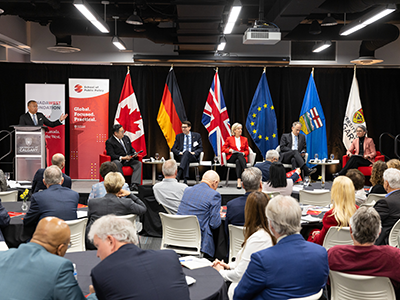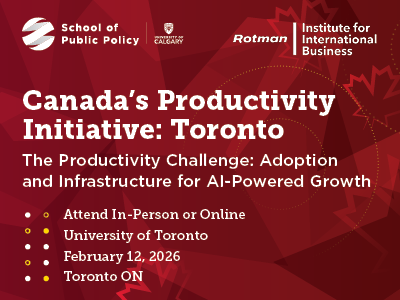NEWS: G7 Ambassadors Panel highlights key economic challenges ahead of Kananaskis Leaders’ Summit

G7 Ambassador Panel
Economic challenges from trade barriers to energy exports were the focus of discussion at the G7 Ambassadors’ Panel hosted by the School and Public Policy and Canada West Foundation ahead of a critical meeting of global leaders in June.
Concern over Europe’s reliance on Russian natural gas and the lack of infrastructure for energy-rich Canada to be a supplier of oil and gas to the continent was a main area of conversation for the panel ahead of the G7 Leaders’ Summit on June 15-17 in Kananaskis.
The panel discussion was moderated by Canada West Foundation President and CEO Gary Mar and Martha Hall Findlay, Director of the School of Public Policy and James S. and Barbara A. Palmer Chair in Public Policy. The panel included:
- His Excellency Matthias Lüttenberg, Ambassador of the Federal Republic of Germany to Canada
- Her Excellency Genevieve Tuts, the Ambassador of the European Union to Canada
- His Excellency Rob Tinline, the British High Commissioner to Canada
The event was held at the Downtown Campus and kicked off with remarks from University of Calgary Chancellor Jon Cornish and Alberta’s newly appointed Minister of Advanced Education Myles McDougall, a former president of the UofC students’ union.
The Kananaskis Summit comes amid multiple armed conflicts around the world and a global trade war initiated by the United States that has targeted G7 members.
With economic security so high on the agenda, it takes the G7 back to the 1970s energy crisis that was the original catalysts for the leaders of key industrialized countries to meet annually a half century ago.
The Ambassadors Panel was held between the conclusion of the G7 Finance Ministers meeting in Banff and the Leaders’ Summit on June 15-17 in Kananaskis. The Leaders last met in Kananaskis in 2002, and it is only the third time the Summit has returned to a location, London and Tokyo were the others.
Cornish set the tone for what is at stake and reinforced a pathway to success in an increasingly polarized world.
“At this critical moment of global cooperation, we must remember that the strength of the G7 has always been our shared commitment to our fundamental values – democracy, human rights, the rule of law and free markets,” Cornish said. “These principles transcend any single administration or political cycle. When discourse threatens our collective voice, we must recognize that fractiousness within our ranks poses a greater threat than any external challenge. A G7 that speaks with courage and conviction about its core values doesn’t require unanimity on every issue, but it does demand that we never compromise the principles that brought us together.”
What’s Next?
The Ambassadors Panel was the first of two G7 events UCalgary will host in advance of the Leaders’ Summit.
On Thursday, June 12, the University and School of Public Policy are teaming with the G7 Research Group at the University of Toronto to host a conference titled Plans, Prospects and Possibilities for the G7 2025 Kananaskis Summit. Dentons Canada is the presenting sponsor of the event to be held on main campus.
The lineup of speakers is led by two former prime ministers; Jean Chretien, who was prime minister when Kananaskis hosted the 2002 Leaders’ Summit, and Joe Clark, who led Canada during the 1979-1980 global energy crisis.
The panel discussions with subject matter experts include: The G7 – Past, Present and Future; Insights on Alberta’s Role in Global Energy, with Premier Danielle Smith; Energy, Energy Security and Critical Minerals; Military and Economic Security; and Quantum Computing, AI and Emerging Technologies.
Follow this link for more information on the June 12 event Plans, Prospects and Possibilities for the G7 2025 Kananaskis Summit.
More Coverage
For further coverage, see the below articles and commentary following the G7 Ambassador event:
- CTV News – Ambassadors say G7 summits remain relevant 50 years later
- The Calgary Herald – ‘It surprises us’: European ambassadors question Canada’s internal trade barriers
- CBC News – What do G7 talks mean for Alberta? An opportunity to centre province in world discussions
- CTV News – Ambassadors to Canada take part in G7 event in Calgary

